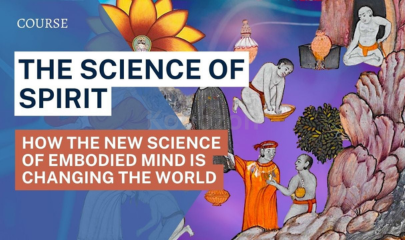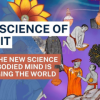-
×
 Framer Training By TRAF
1 × $5,00
Framer Training By TRAF
1 × $5,00
The Science of Spirit: How the New Science of Embodied Mind is Changing the World – Collection By Joe Loizzo
$149,00 $23,00
SKU: KOB.50942hvCKv0
Category: Science
Tags: Collection, How the New Science of Embodied Mind is Changing the World, Joe Loizzo, The Science of Spirit
The science of spirit: How the new science of embodied mind is changing the world – Collection by Joe Loizzo – Digital Download!
Let’s embark on a captivating adventure to uncover remarkable insights that spark your curiosity and elevate your understanding

The Science of Spirit: How the New Science of Embodied Mind is Changing the World – Collection By Joe Loizzo
Overview

The science of spirit: How the new science of embodied mind is changing the world – Collection by Joe Loizzo
In an era where scientific exploration and contemplative practices intertwine more than ever, the collection “The Science of Spirit: How the New Science of Embodied Mind is Changing the World” by Joe Loizzo stands as a beacon of enlightenment. Dr. Loizzo, a contemplative neuropsychiatrist and founder of the Nalanda Institute for Contemplative Science, embarks on a profound journey exploring the complex relationship between neuroscience and holistic practices like meditation and yoga. By delving into the transformative effects of the “embodied mind” concept, he reveals how this integration between our mental and physical states is paving new pathways for personal and societal well-being. Indeed, the integration of mind and body revealed through advances in neuroplasticity and emotional regulation offers promising insights into various fields, including health, education, and psychology.
The Embodied Mind: An Integration of Experiences
At the heart of Dr. Loizzo’s exploration lies the concept of the “embodied mind.” This idea encompasses a profound understanding that our mind and body are not separate entities, but rather an integrated mechanism working harmoniously. The interconnection between mental processes and bodily sensations provides insights into resilience and overall well-being.
The Mind-Body Connection
The mind-body connection has intrigued scholars and practitioners for centuries. The ancient wisdom from Eastern traditions, such as yoga and mindfulness, resonates with contemporary neuroscience, which now recognizes the brain’s neuroplasticity the ability to reorganize itself by forming new neural connections throughout life. This understanding brings forth a profound motivation to integrate these practices into mental health treatments.
- Neuroscience teaches us that our thoughts can reshape our brain structure.
- Contemplative practices like meditation and yoga enhance mental clarity and emotional stability.
Research Evidence: Numerous studies highlight the positive impact of embodied practices on mental health. For instance, a meta-analysis published in the journal Psychological Bulletin reported that mindfulness meditation improves attention, emotional regulation, and overall psychological well-being.
Emotional & Somatic Responses
Dr. Loizzo emphasizes the importance of targeting deeper neural structures that are responsible for emotional and somatic responses. This perspective diverges from traditional therapeutic practices, focusing instead on how embodied practices can effect profound neurobiological changes. Here’s how:
- Trauma Treatment: Conventional therapies often address trauma through cognitive methods. However, embodied practices engage the body’s memory a crucial aspect of healing.
- Stress Resilience: Through practices like yoga, individuals can foster resilience, enhancing their capacity to cope with stress effectively.
The synthesis of these approaches provides a more holistic approach to mental health, contributing to overall well-being.
Bridging Science and Contemplative Wisdom
Dr. Loizzo’s work is distinguished by its unique blend of scientific inquiry and contemplative wisdom. This interdisciplinary approach paves the way for a fresh perspective on mental health, urging a paradigm shift in how we perceive human potential.
The Holistic Approach
Taking a holistic approach means considering both the psychological and physiological aspects of our being. Dr. Loizzo advocates for the integration of scientific methodologies with contemplative practices to seek sustainable outcomes. This might involve:
- Implementing mindfulness-based stress reduction (MBSR) programs in clinical settings.
- Encouraging regular participation in yoga as part of a comprehensive treatment plan for anxiety and depression.
The convergence of Eastern and Western practices signifies a progressive step towards a more profound understanding of the human experience.
Case Studies and Real-World Applications
Loizzo’s methodologies have already shown promise in various settings, resonating with both individual practitioners and healthcare professionals. These examples underscore the practical implications of the embodied mind theory:
- Trauma Recovery Programs: Several rehabilitation centers have integrated yoga and mindfulness practices with cognitive therapies, significantly enhancing patient recovery rates.
- Educational Frameworks: Mindfulness education in schools has led to noticeable improvements in both student engagement and emotional well-being.
The principles espoused in Loizzo’s collection are not mere theoretical musings; they offer a practical framework for addressing contemporary psychological challenges.
The Therapeutic Shift: Looking to the Future
As the dialogue surrounding mental health evolves, Dr. Loizzo’s work highlights a vital shift towards recognizing the body’s role in psychological well-being. By nurturing an understanding of the embodied mind, we stand at the precipice of groundbreaking therapeutic implications.
Transformative Therapeutic Practices
The new paradigm shift implies that traditional models of therapy could benefit from integrating movement and embodied practices. Some transformative practices to consider might include:
- Somatic Experiencing: This body-oriented approach helps individuals reconnect with their bodily sensations as a pathway for trauma recovery.
- Dance and Movement Therapies: They engage both the mind and body, facilitating emotional expression and healing.
Future Implications in Mental Health Fields
The future may hold substantial implications for mental health professionals, educators, and even policymakers. Incorporating embodied practices can lead to a more integrated and resilient human experience. Here are potential future directions:
- Policy Initiatives: Advocating for meditation and mindfulness training as part of mental health interventions.
- Workshops for Practitioners: Providing training on combining traditional psychotherapy with embodied practices, equipping therapists with diverse, effective tools.
Dr. Loizzo’s research underlines that understanding neuroplasticity and incorporating mind-body practices can lead to sustainable paths for self-improvement and community transformation, forging a brighter collective future.
Conclusion
Joe Loizzo’s “The Science of Spirit” presents a compelling case for the interplay between neuroscience and contemplative practices, demonstrating their potential in transforming mental health paradigms. The journey toward understanding the embodied mind not only enriches our individual experiences but also shapes a collective consciousness that advocates for integration, resilience, and holistic well-being. As the scientific community and contemplative traditions converge, the implications for trauma, health, and education become tantalizingly profound, indicating a path forward where human potential can thrive through the understanding and practice of an embodied mind. The call to action remains clear: embrace these transformative insights to cultivate a more resilient and interconnected world.
Frequently Asked Questions:
Innovation in Business Models: We use a group purchase approach that enables users to split expenses and get discounted access to well-liked courses. Despite worries regarding distribution strategies from content creators, this strategy helps people with low incomes.
Legal Aspects to Take into Account: Our operations’ legality entails several intricate considerations. There are no explicit resale restrictions mentioned at the time of purchase, even though we do not have the course developers’ express consent to redistribute their content. This uncertainty gives us the chance to offer reasonably priced instructional materials.
Quality Control: We make certain that every course resource we buy is the exact same as what the authors themselves provide. It’s crucial to realize, nevertheless, that we are not authorized suppliers. Therefore, the following are not included in our offerings: – Live coaching sessions or calls with the course author.
– Entry to groups or portals that are only available to authors.
– Participation in closed forums.
– Straightforward email assistance from the writer or their group.
Our goal is to lower the barrier to education by providing these courses on our own, without the official channels’ premium services. We value your comprehension of our distinct methodology.
Be the first to review “The Science of Spirit: How the New Science of Embodied Mind is Changing the World – Collection By Joe Loizzo” Cancel reply
You must be logged in to post a review.



















Reviews
There are no reviews yet.